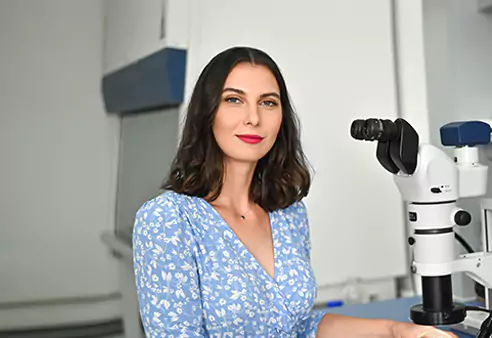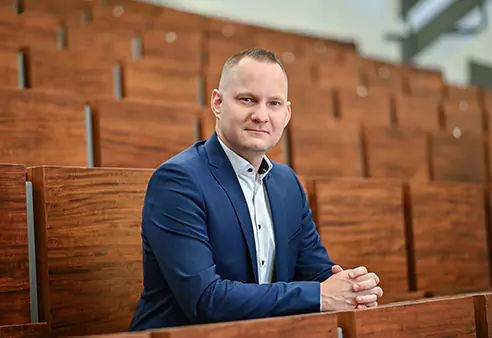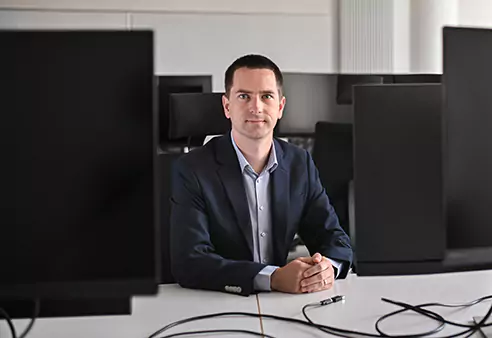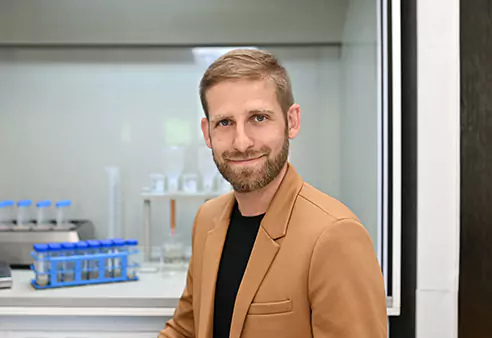RNDR. Matej Baláž, PhD. works at the Institute of Geotechnics of the Slovak Academy of Sciences in Košice (IGT SAS). His research focuses on solvent-free chemistry, also called mechanochemistry, that uses mechanical energy in the form of grinding and creates nanomaterials that can be used in energy conversion or in medicine.
Very simply put, mechanochemistry is about chemical reactions of solids – powders. We avoid using organic solvents and externally raising pressure and temperature. This presents a great environmental advantage as opposed to traditional chemistry,” Matej Baláž says, explaining the specifics of mechanochemistry. Instead, the energy is supplied by a reactive powder during milling.
Matej Baláž first started studying the details of mechanochemistry during his postgraduate studies at the IGT SAS. He dealt with mechanochemistry by processing eggshells for their ability to treat waste water, remove chlorine from PVC-based waste by milling it together with the eggshells, and provide the option to create semiconducting lead (II) sulphide by reacting the sulphur present in the eggshell membrane with lead (II) acetate. He is currently researching the possibility of using this process to create other sulphides.
Mechanochemistry in waste recycling is not limited to eggshells. Together with a postgraduate student from Kazakhstan, Matej Baláž pointed out the possibility of recovering copper from copper slag, where milling significantly improves the yield of recovered copper. Besides doing experiments, Matej Baláž had summed up his previous knowledge of mechanochemical processing of various types of waste around the world in a 619-page monograph that is composed of 1,017 studies on the topic, which he published as a solo author with Springer.
In 2016, thanks to work with his wife Ľudmila, he started dealing with the topic of antibacterially active silver nanoparticles. He specifically discovered the possibility to create them as bionanocomposites by milling silver nitrate together with some common plants (such as thyme, wild thyme, black elderberry, or lavender). Later on, he and his colleagues at the Institute of Botany of the Slovak Academy of Sciences and the Faculty of Science of Pavol Jozef Šafárik University in Košice were able to use lichen, even from Antarctica, instead of these plants.
Scientists at the Department of Mechanochemistry of the IGT SAS have long been focusing on mechanochemical synthesis of metal chalcogenides, especially composites of sulphur or selenium with metals. Matej Baláž made his most significant discovery in this field in 2016, when he presented the possibility of synthesising copper sulphites, such as covellite CuS or chalcocite Cu2S, in quick milling. This is a so-called mechanically induced self-propagating reaction (MSR) that occurs when, after a period of milling that does not yield any products, elements react completely within a second. This process had never been observed before in copper-sulphur reactions. The key seems to lie in the specific morphology of the copper used. At the moment, Matej Baláž is working to fundamentally explain the process and research it in other combinations of metals, sulphur, and selenium.
He became a scientist thanks to his father, who is active in the same field. At first, he considered being a sports commentator, but finally he decided to study chemistry at Pavol Jozef Šafárik University in Košice. After graduation, he changed his focus from organic chemistry to materials science as a scientist at the Slovak Academy of Sciences, where he has been working ever since. His various successes include being one of the Forbes “30 under 30” in 2016 in the category of science. In 2019, he received the Slovak Scientist of the Year Award in the Young Scientist category and in 2021 the Slovak Academy of Sciences awarded him for his popularisation of science. He is the first Slovak to become a member of the prestigious Young Academy of Europe and in 2021 he was a finalist of the ESET Science Award in the Outstanding Scientist in Slovakia Under the Age of 35 category. As for foreign collaborations, he works with the Al-Farabi Kazakh National University in Almaty (Kazakhstan), where he is the foreign supervisor of four postgraduate students and where he spent a month in 2021 as an invited lecturer. This year, he spent three months at Ruhr University Bochum in Germany.
Besides being a full-time scientist, Matej Baláž is also a full-time father. He enjoys spending time with his wife and two children, whom he loves laughing with. He also finds the time to exercise. He has been playing tennis since the age of five and, although he has never been a professional, he has been able to keep his spot in the top 100 Slovak singles and doubles players. Thanks to his resemblance to the Spanish tennis player Rafael Nadal, he is also called “the Rafa of Košice”. He also likes to run and play football.



